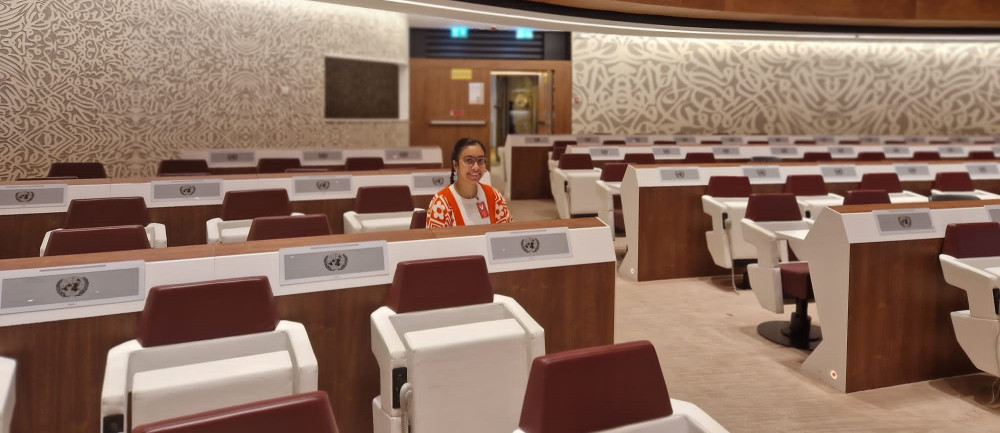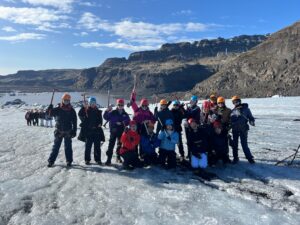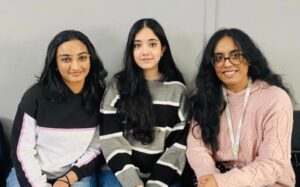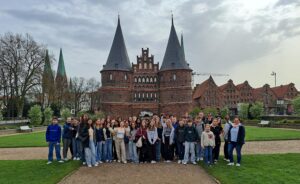Upper Sixth student Lamees used the KEHS Travel Scholarship she was awarded back in January 2023 to spend a week in Geneva during the recent half term. Here, she visited a number of multilateral agencies, including the World Health Organisation, the Global Alliance for Vaccination and Immunisation, and the United Nations, with the objective of understanding how these organisations function and the initiatives they have undertaken since COVID-19 to support women. You can read all about Lamees’ trip below.
Even before the world had heard of COVID-19 and its devastating global impact women fared far worse than men both economically and socially. However, COVID-19 has extended the gender gap and women are more at risk of access to health, employment opportunities and increased violence. It is not just in developing nations that women are disadvantaged but also in developed countries. This is taking place despite the world agreeing to the United Nations Sustainable Development Goals (SDGs) which strongly affirms that sustainable human development cannot take place without women being able to contribute on an equal basis with men. If immediate changes do not take place not only will the world not achieve the SDGs, but women will lag further in the gender gap.
Women’s ability to achieve gender equality is based on three pillars first access to healthcare and in the post-COVID-19 period that also includes vaccinations. Second, opportunities that allow them to attain their full potential and contribute as economic agents in society. Third, development has to be carried out sustainably so that the world and its resources are not depleted and available for the long term.
To understand these three pillars and their interrelationship I decided to use the KEHS Travel Scholarship Award to meet with the multilateral agencies responsible for promoting these three pillars. My specific learning objectives were to understand how multilateral organisations based in Geneva are working to support women globally more specifically in developing nations. I wanted to understand how the multilateral organisations function and the initiatives that they have undertaken since COVID-19 to support women. At the same time, I wanted to bring to the attention of these multilateral organisations how schools such as KEHS can be an instrument of change. In doing so I wanted to leave a KEHS legacy in Geneva for future pupils from the school to capitalise.
Global Health Policy
Change for women starts with access to healthcare at the global level GAVI – the Global Alliance for Vaccination and Immunisation is a unique multilateral organisation that seeks to synergise the strengths of private and public sector organisations by bringing together the knowledge of developmental agencies and the expertise of the private companies developing vaccines.
GAVI brings together all the stakeholders e.g. UN agencies, the World Health Organisation, the World Bank, the private companies developing vaccines, and charities such as the Bill and Melinda Gates Foundation, non-governmental organisations operating largely in developing nations, and individuals active in the sector, in the drive for vaccination through equitable and sustainable use of vaccines thereby ensuring that no one is left behind with immunisation.
Through my meetings at GAVI, I was able to understand how it helps to protect the future generation of women. At the global level, there is no differentiation between immunisation for boys and girls however through its partnership model it can overcome challenges in communities where girls do not have access to vaccines. Through GAVI’s intervention over the last 23 years, it has vaccinated over one billion children across 78 countries and prevented about 17.3 million deaths. Through my interactions with GAVI staff, I was able to learn about the social and economic realities of vaccination programmes. One of the most interesting facts was that for every US$ 1 that GAVI invests in developing nation’s leads to a US$ 21 saving in future healthcare costs, lost income, and productivity. More importantly, vaccinated people live longer and healthier lives leading to an estimated US$ 54 in return for per US$ 1 spent.
I was fortunate to visit the World Health Organisation (WHO) and meet with the team that is working on several important health-related issues at a global level. My particular interest was the gender-based work that it carries out in developing nations.
I was able to learn how a multilateral organisation can carry out its activities in the most remote of villages helping people gain access to healthcare. The work of the WHO shows that gender impacts an individual’s experience and access to healthcare which includes being affordable, accessible, and provided with quality, equity and dignity.
As someone who is applying to study medicine, I found these aspects to resonate with what I believe are the essentials of healthcare globally. It also raised the question as to why gender inequality in healthcare existed. The WHO staff explained to me that one should not view healthcare with a Western lens but the realities that exist across the world. For example, mobility and being able to travel to access healthcare may be restricted either by communities themselves or the natural terrain of the area, lack of literacy, discriminatory attitudes of both the communities and healthcare providers that place men before women and lack of training and awareness amongst healthcare providers. As a result, women face greater healthcare risks and unfortunately, deaths which in many cases are preventable.
Sustainability
I was able to observe meetings at the Palais des Nations which is the Geneva headquarters of the United Nations whilst the second one is in New York. On the day that I visited the Palais des Nations an important meeting was taking place regarding sustainability.
Two issues became apparent during the meeting – first climate change, biodiversity loss and pollution are a reality the impact of which has already started to impact communities especially those that can least deal with the challenges. Not dealing with these challenges poses risks to the global efforts to reduce poverty and improve lives. Therefore, the world must work towards the pledge made at COP 26 in Glasgow of reducing emissions, so that the rise in the global average temperature can be limited to 1.5 degrees.
However, this brings up the second issue of financing sustainability. At COP 26 nations agreed to provide US$100 billion from developed to developing countries. Whilst this will allow for some initiatives to take place it is nowhere close to the US$2 trillion annually till 2030 that the International Energy Agency estimates is required in these countries to achieve the goals. The World Bank estimates that developing nations will need to invest on average 4.5% of their GDP in achieving the targets set out at COP 26. It was interesting for representatives from the least developing nations (LDCs) to put forward the case that this is not possible as they have limited resources that do not allow such investment. The meeting explored different ways in which developing countries especially the LDCs could work towards achieving the goals of COP 26. Unfortunately, climatic impact does not stop at national borders and the drive for the goals of COP 26 is as strong as the weakest country pushing for them.
Inclusive Trade Opportunities
The McKinsey Institute estimated that it would take about 100 years for the gender gap to be bridged at the current rate. The International Trade Centre (ITC) is part of the United Nations Committee on Trade and Development (UNCTAD) and the World Trade Organisation (WTO) to conduct in-country activities to support trade and development. One of the initiatives it has is to support inclusive trade opportunities which seeks to assist women to start and grow their businesses. The reality is that employment opportunities may not always exist especially for women and entrepreneurship is an effective alternative. The ITC conducts several initiatives the most prominent of which is SheTrades which helps to foster female entrepreneurship.
Through my interaction with the ITC team, I was able to understand the challenges that women face in the world of entrepreneurship and how the SheTrades initiative is working to overcome them. I was able to learn that assisting female entrepreneurship does not deprive men of their opportunities. Encouraging female entrepreneurs allows them to cater to a different clientele thus creating synergistic gain for the whole economy. Studies have shown that female entrepreneurs are more innovative largely to their ability to perceive opportunities differently. Further, there is a direct correlation between female entrepreneurship in developing countries and the improvement in family health.
After an exciting week in Geneva, I was able to understand the work of multilateral organisations and the difference that they make to developing nations particularly those that are vulnerable. Through my interactions with GAVI, WHO, UN and the ITC I learnt that gender equality does not operate in a vacuum, and it is important to have effective healthcare and economic opportunities. More importantly, gender development requires initiatives to be sustainable.
